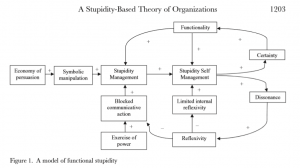TSElosophers meeting 23.10.2020. Erkki Lassila, Kai Kimppa, Kari Lukka, Maija-Riitta Ollila, Milla Wirén, Otto Rosendahl.
Diefenbach, T. (2019). Why Michels’ ‘iron law of oligarchy’ is not an iron law – and how democratic organisations can stay ‘oligarchy-free’. Organization Studies, 40(4), 545-562.
Summary
Diefenbach’s article aims to refute Michels’ Iron Law of Oligarchy, which states that the essence of organization “gives birth to the elected over the electors, of the mandatories over the mandators, of the delegates over the delegators.” The article divides Michels’ prosaic writings into six arguments:
1. Organisation is based on division of labour, leading to specialization
2. Specialisation creates specialists and leadership must be provided by specialists
3. It leads to a distinction between superiors and subordinates
4-6. Professional leaders cannot be influenced or controlled by the subordinates, strict compliance becomes a necessity for subordinates and leaders form a cartel or ‘closed caste’, making their ruling permanent
These points show a compelling slide from democracy into oligarchy. Moreover, the Iron Law cannot be empirically disproven, since any extant democratic organization might later turn into oligarchy. Therefore, Diefenbach sets to counter each of the above points on theoretical and methodological grounds.
The article approaches an important concern, but suffers from structural shortcomings. It is motivated to oppose the performativity of the Iron Law, which is sometimes simplistically applied e.g. to provide ironclad justification for the oppressors or a solid rationalization for the passivity of cynics and spectators. Ironically, the article itself adopts some simplistic stances due to its mechanistic approach and short length.
Our discussion
In contrast to the technic-functionalistic approach in the article, TSElosophers’ discussion omitted the point-by-point structure and concentrated on what was more or less overlooked in the article: power considerations, scale and type of organizations and perspectives from social psychology.
We felt that Diefenbach’s definition on legitimacy would have needed to include power considerations. Generally, we suggested that the underlying driver of the kind of processes like the emergence of oligarchies is seeking powerful positions, and once gained, keeping such positions intact. Diefanbach emphasized the acceptance of internal and external stakeholders, but remained mute on the relative power of stakeholders. Although oligarchy draws the support from the ruling elites and the related beneficiaries (plutocracy, class ideology, nepotism, etc.), democratic legitimacy comes from supreme power being subjugated to the tiniest of powers, especially the power of individual persons. Oligarchies can hardly demonstrate that their supreme power is subjected under a network of powers to include the poor, the sick and the nonconformists.
Diefenbach soon abandons the starting point of discussing all organizations in favour of pitting the (varying) legitimacy of democratic organizations against the (varying) illegitimacy of oligarchic organizations. TSElosophers discussion moved beyond this distinction to consider other important organizational qualities, such as scale and type. We agreed that the scale of organizations positively correlates with the prevalence of oligarchy; it requires less insight and institutional work to keep smaller organizations democratic.
Also, the political, business, educational, scientific and other type of organizations’ legitimacy concerns differ. For example, many business organizations are ruled by the few over the many with little qualms to their legitimacy. To the extent the business organization is perceived to serve customers who are informed symmetrically and provided with competing choices, it gains legitimacy as its survival depends on paying attention to the viewpoints of a plurality of stakeholders. In sharp contrast, we feel that the scientific and educational organizations, including University of Turku, too often centralize and standardize, although effectiveness could be substantially improved with more grassroots democratic administration and teaching practices.
We further contextualized the topic with psychological perspectives. One in our group found evolutionary psychological hypotheses useful for considering the gap between personal traits of good leaders and those adept at climbing the career ladder. Another referred to Fromm’s book ‘Escape from Freedom’ that posits a substantial minority of humans as inflicted by behavioral sado-masochism: with tendencies to desire strongman leaders and act as one if placed in a superior position. Still another emphasized prospect theoretical uncertainty aversion: Superiors might fear vengeance if their power position weakens and sub-ordinates might continue to tolerate the ruler if only because that’s the devil they already know.
Overall, the article diluted the Iron Law into the Iron Threat of Oligarchy. Not having read the original text on Iron Law by Michels, we remain unsure if any refutations were made or if Diefenbach merely framed the same issue with more positive overtones. The novel framing emphasizes the constant need to take care of democracy. As such, Diefenbach’s article is best to be read as a list of threats against democracy and the key mechanisms for internally nurturing democracy in organizations.
